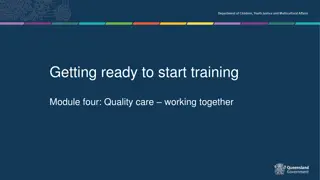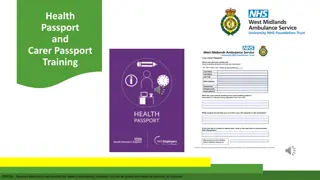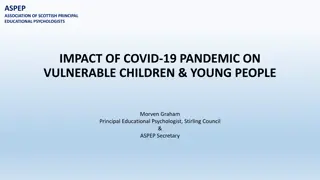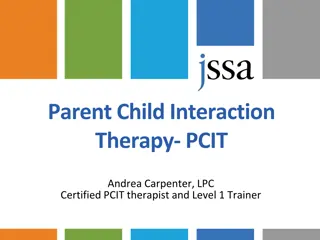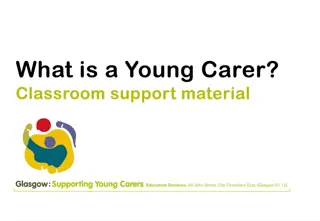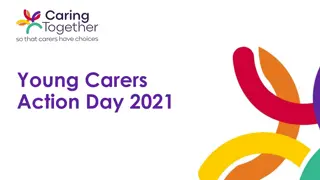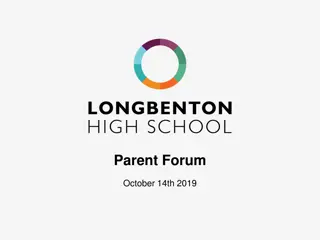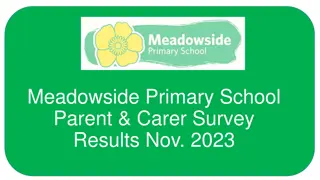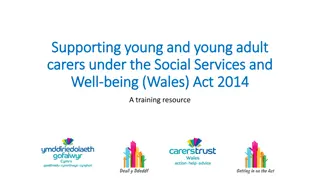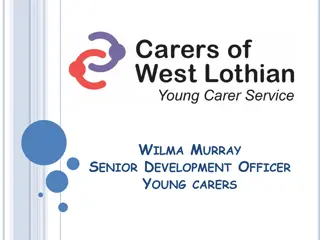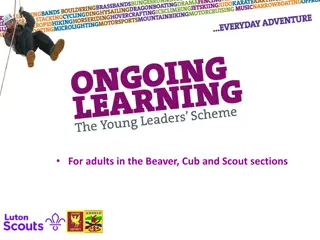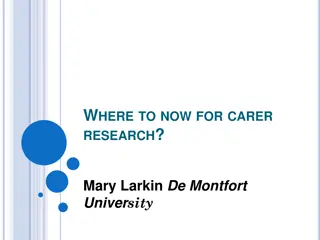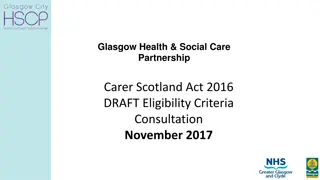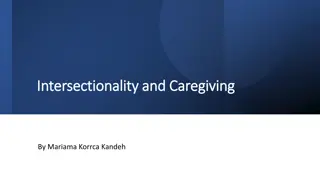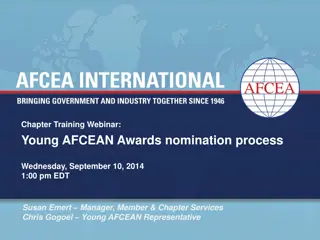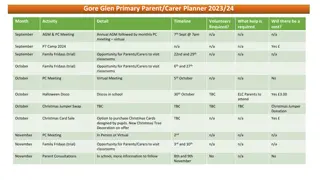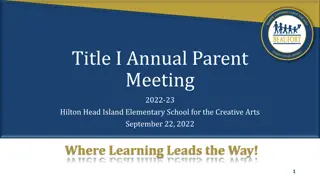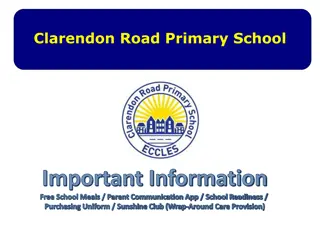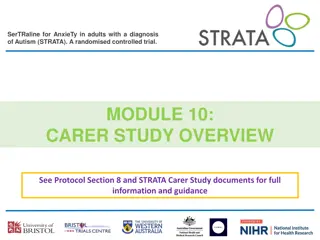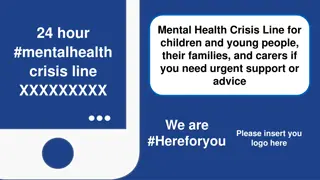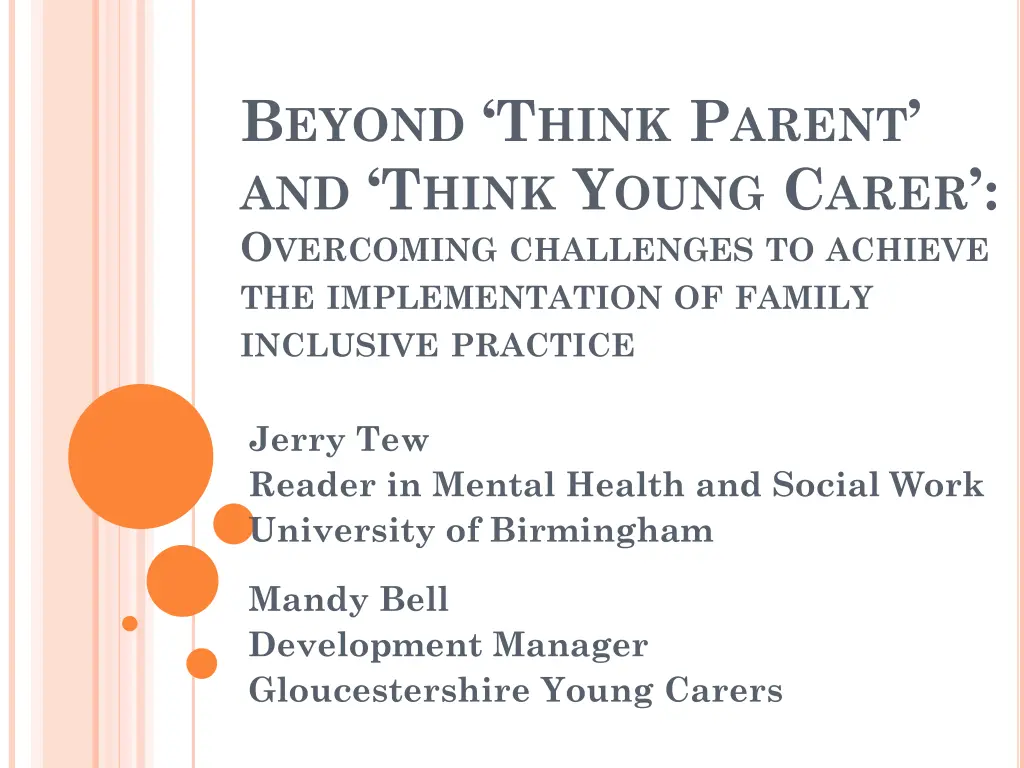
Achieving Family Inclusive Practice: Overcoming Challenges
Explore the journey of implementing family-inclusive practices, overcoming obstacles to foster positive outcomes. Learn about key principles, levels of family-mindedness, and shifting paradigms towards proactive family development.
Download Presentation

Please find below an Image/Link to download the presentation.
The content on the website is provided AS IS for your information and personal use only. It may not be sold, licensed, or shared on other websites without obtaining consent from the author. If you encounter any issues during the download, it is possible that the publisher has removed the file from their server.
You are allowed to download the files provided on this website for personal or commercial use, subject to the condition that they are used lawfully. All files are the property of their respective owners.
The content on the website is provided AS IS for your information and personal use only. It may not be sold, licensed, or shared on other websites without obtaining consent from the author.
E N D
Presentation Transcript
BEYOND THINK PARENT AND THINK YOUNG CARER : OVERCOMING CHALLENGES TO ACHIEVE THE IMPLEMENTATION OF FAMILY INCLUSIVE PRACTICE Jerry Tew Reader in Mental Health and Social Work University of Birmingham Mandy Bell Development Manager Gloucestershire Young Carers
KNOWLEDGE EXCHANGE 2015-16 FAMILY INCLUSIVE POLICY AND PRACTICE Hosted by University of Birmingham www.familypotential.bham.ac.uk ESRC
THINK FAMILY : KEY PRINCIPLES (CABINET OFFICE, 2007) A broad and flexible understanding of family as a relational network of significant others who may or may not have ties of kinship or marriage, and may or may not be co-resident. A recognition that all family members need to be seen as people in their own right with multiple roles and relationships inside and outside the family A focus on relationships between different family members [that] uses family strengths to limit negative impacts of family problems and encourages progress towards positive outcomes (p.30) No wrong door a whole family assessment of need and capabilities irrespective of referral route(s).
LEVELS OF FAMILY MINDEDNESS Predominantly individual focus with other family members being consulted and expected to provide support 1. Focus on axial relationships (Cornford et al., 2013) i.e. dyads such as parent-child, carer- vulnerable adult in which one party can tend to be seen primarily in relation to their designated role (as carer or parent) 2. Focus on family as a relational network of significant others 3.
KNOWLEDGE EXCHANGE SEMINAR 1 (CAMDEN JUNE 2015) A number of delegates shared their experiences of striving to widen the idea of family beyond a narrow focus on parents (usually mothers) and parenting, or singular carers and vulnerable adults. However, this was not always easy within a wider context in which expectations around evidence based practice tended to promote a degree of tunnel-vision, with pressure to focus on discrete interventions that had been experimentally validated, such as parenting programmes, but which only engaged with a small part of the complexity of families lives (Tew J et al, 2016).
HOW DO WE LOOK AT FAMILIES AND FAMILY RELATIONSHIPS? Family as deficit / cause of problems OR Family as asset-base / resource for resolving difficulties Moving from a reactive safeguarding paradigm to a proactive family development paradigm which may include support in improving family relationships
WHATS BEEN GOING ON? INTENSIVE FAMILY SUPPORT / INTERVENTION Family Intervention Projects Parental and child mental health consistently emerged as an issue and one where little progress was made Troubled Families / Strengthening families Recognition of need to move beyond focus on presenting issues to underlying issues including mental health and domestic violence Family Recovery Projects Embedded mental health and substance use specialists in core team
WHATS GOING ON? JOINING UP CHILDREN S AND ADULT MENTAL HEALTH SERVICES Think Family Pilots SCIE Organisational focus Progress patchy across implementation sites Could be a lever for whole systems change within and across organisations Rarely Level 3 in practice
WHATS GOING ON BOTTOM UP Family Group Conferencing Children s services Adults services and mental health Open Dialogue Mental health Family-in-Community approaches E.g. Big Lottery funded Improving Futures projects Young Carers initiatives Can lead to wider system change
FAMILY INCLUSIVE APPROACHES: GLOUCESTERSHIRE YOUNG CARERS InterAct Whole family programme of intervention ASSESSMENT PARENTS CHILDREN FAMILY PARENT/ CHILD Stress / protective factors e.g. finance, housing, bullying, parent-school interaction, social networks, adult & peer relationships. PLANNING AHEAD Parent, child, facilitator and care coordinator. Introduction to the whole family. Understand the impact the mental illness has on all family members. Encourage children to ask questions. Support family to talk together about mental illness. Reduce guilt / self blame / fear. Young carer crisis plan. Recognition of achievements. Strategies to minimise the impact. Coping strategies. Recognise strengths and achievements. Develop plan to meet identified need. Share info and resources. Acknowledge child s role. Set a date for review. Access parent/child activity.
GLOUCESTERSHIRE YOUNG CARERS: INTERACT Young Carers said: ''helped me to understand my mum s condition and how to help her through it' My mum now understands how things affect me and my sister I now know what could happen to mum & what to do I know that M will look after me if mum is ill I feel I can talk to my mum about how she is Parents said: ...enabled me to interact better with my child I am good at taking my child out now
GLOUCESTERSHIRE YOUNG CARERS: INTERACT Coordinators said: It opened a dialogue between the family and myself as care coordinator, which has been very helpful .... assured that one of the risk issues identified, the impact of Mum s mental health on the child, was being systemically and sensitively addressed
GLOUCESTERSHIRE INTERACT OUTCOMES Young Carers 100% improvement in understanding of parental mental ill health 91% feel more able to cope 82% improvement in family relationships; mental health and wellbeing; self esteem Parents 100% improvement in mental health and wellbeing 75% improvement in ability to carry out parenting responsibilities when experiencing mental ill health 67% improvement in family relationships 23 individuals from 9 families Less that 1% no shows (1/145)
CARE ACT 2014 AND GUIDANCE: THE CARE ACT AND WHOLE-FAMILY APPROACHES Practical guidance for practitioners working in adult social care in relation to carrying out assessments and developing plans which consider the needs of the whole family Principle of wellbeing (i.e. not primary focus on risk / deficit) Step one: Think family. Step two: Get the whole picture. Step three: Make a plan that works for everyone. Step four: Check it s working for the whole family.
The interdependencies and interconnections between family members mean that what happens to one affects everyone else. Caring is a universal activity and an important part of family relationships. Whole-family approaches can be key in maximising the impact of resources and identifying opportunities to support carers, and to ease the very real risks to health and wellbeing that caring can bring. Level 3
MEMORANDUM OF UNDERSTANDING TO AID JOINT WORKING BETWEEN CHILDREN AND ADULT SOCIAL SERVICES Local authorities to adopt a whole system, whole council, whole-family approach, coordinating services and support around the person and their family and considering the impact of the care needs of an adult on their family, including children. Specific consideration of young carers in a whole family context (with explicit tie-in with Children and Families Act 2014)
IN RELATION TO SERVICES OF WHICH YOU ARE FAMILIAR What difference could / does a level 3 approach make for adults with mental health difficulties who are parents for children who are caring? What are the barriers and enablers to implementing level 3 family-inclusive practice at a local level?
REFERENCES Cabinet Office (2007) Reaching out: think family. Analysis and themes from the Families At Risk review. London: Cabinet Office Social Exclusion Task Force Cornford, J., Baines, S. and Wilson, R. (2013) Representing the family: how does the state think family ? Policy & Politics, 41 (1): pp. 1 18 DH / LGA / ADASS / Children s Society / Carers Trust (2015) The Care Act and whole-family approaches. http://www.local.gov.uk/documents/10180/575632 0/The+Care+Act+and+whole+family+approaches/ 080c323f-e653-4cea-832a-90947c9dc00c
SCIE (2012) Think child, think parent, think family: final evaluation report http://www.scie.org.uk/publications/reports/report 56.pdf Tew, J et al (2016) What has happened to Think Family challenges and achievements in implementing family inclusive practice. In M Diggins (ed) Parental Mental Health and Child Welfare Work Volume 1. Pavilion


